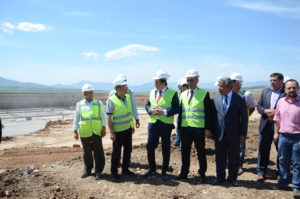
Technical Assistance for Implementation of Civil Society Dialogue and Civil Society Support Programmes (TR2015/DG/01/A5-01/001)
The overall aim of the project is to increase bilateral exchanges and cooperation between CSOs in Turkey and the EU at local, regional and national levels, to promote awareness raising initiatives on importance and benefits of membership of Turkey to the EU within Turkey and EU and on

Technical Assistance and Supervision for Kahramanmaraş Water and Wastewater Project
The quality of the drinking water and its consumption is one of the most critical topics for the European Union and the whole world. Based on this context, the programme aimed to accelerate Turkey’s accession to the EU by enabling Turkey to achieve a high level of environmental

Strengthening of an Integrated Strategic Approach to Increase the Efficiency and Productivity of IPA Funds during the Third Period (2021-2027)
This project’s main objective is to further increase and consolidate administrative capacity of the Turkish administration for more effective and efficient management and absorption of IPA funds, in addition to strengthen the capacity of NIPAC and other relevant institutions in the area of strategic planning and programming, proper

Technical Assistance for Promoting Women’s Employment in Turkey
The employability of women has been a challenging issue in Turkey for decades. The labour market of women needs to be improved in terms of the existing capacity to design, develop and implement policies to attract and retain more people in employment, particularly by increasing the participation of

Technical Assistance for Revitalisation of History in Şanlıurfa
While tourism has been, and continues to be, important to the local economy, it has not matched its potential. To remedy this and attract more tourists, local government and businesses in the city decided to ensure that the standard of services offered to visitors met internationally accepted standards

Technical Assistance for Promoting Registered Employment
Unregistered employment remains one of the critical concerns and significant challenges of the Turkish labour market. Even though recent years have seen a downward trend in unregistered employment, a substantial portion of Turkey’s workforce is still employed without being registered with the social security system. In this regard,

